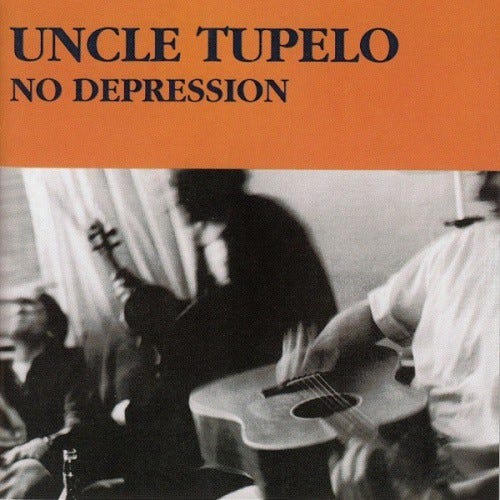Uncle Tupelo — No Depression — 1990
18.February.2021
Uncle Tupelo
No Depression
1990
Recorded in 1990 for 3,500, Uncle Tupelo’s No Depression gave a name to a genre of music (No Depression is often used as a synonym with Alt-Country), spawned a magazine (No Depression), and launched the careers of two of the best songwriters of a generation (Jeff Tweedy and Jay Farrar).
After shifting their sound from a punk sound to something closer to rock, the Uncle Tupelo trio — Tweedy, Farrar, and drummer Mike Heidorn — built a reputation as one of the best live bands in the region. Soon, they recorded a demo tape, Not Forever, Just for Now, which got them noticed nationally.
However, despite the recognition and the band’s exhaustive touring schedule, labels remained wary of signing Uncle Tupelo. The band’s “problem,” as A&R scouts saw it, was that Uncle Tupelo straddled the fence between the cowpunk movement that spawned bands like Lone Justice, Jason & the Scorchers, and X and the burgeoning grunge scene that gave birth to Nirvana, Soundgarden, and Mudhoney.
The band eventually signed with indie label Rockville Records. Shortly after, the trio holed up in Boston’s Fort Apache South with producers Sean Slade and Paul Q. Kolderie (Pixies, Warren Zevon). Emerging ten days later with their debut album, No Depression.
I’ve often said if I had a band, Uncle Tupelo is exactly how I would want it to sound.
Many of these songs serve as an homage to the band’s growing up in a small Midwestern town, Belleville, IL. And while Tweedy (bass) and Farrar (guitar) trade lead vocal duties, the lyrics' lyricism belie their age — all three were +/- 23 years old. They tackle some weighty themes like war, unemployment, and alcoholism.
On “Train,” the band bundles up the angst of every 21-year-old of the Cold War era:
A quarter after two
Sittin’ in my car, watching
Waiting on a train
Ninety-seven flatcars
Loaded down with troop trucks and tanks
Rolling by
I’m twenty-one, and I’m scared as hell
I quit school, I’m healthy as a horse
Because of all that I’ll be the first one to die in a war
And the imagery that Farrar employs on “Whiskey Bottle” beautifully captures the essence of depression:
Persuaded, paraded, inebriated, and down
Still aware of everything life carries on without
’Cause there’s one too many faces with dollar sign smiles
Got to find the shortest path to the bar for a while
A long way from happiness
In a three hour away town
Whiskey bottle over Jesus
Not forever, just for now
Not forever, just for now
On No Depression, Uncle Tupelo executes the lyrical imagery of Woody Gutherie while paying tribute to their love of punk by using the start/stop music pattern found in bands like The Replacements (on their earlier albums).
[Fun Fact: Uncle Tupelo opened for The Replacements in 1991.]
According to Jeff Tweedy in an interview from 1988:
“We have two main styles that have been influences. For instance, we like Black Flag as much as early Bob Dylan and Dinosaur Jr. as much as Hank Williams… To us, hard-core punk is also folk music.”
As evidence of their influences, they put a couple of cover songs on No Depression. The title track, written by The Carter Family Patriarch, A.P. Carter, and “John Hardy” from a traditional arrangement by blues artist Lead Belly.
Released in June of 1990, the album was instantly recognized and quickly became a critical favorite, singling out its unique sound and originality.
In her review of the No Depression re-issue, Annie Zaleski at the AV Club wrote:
“Farrar sings (and writes) like an old soul whose wizened insights balance out Tweedy’s uncertain perspectives, giving Uncle Tupelo multiple levels of depth.”
Rolling Stone didn’t review No Depression when initially released but would later call the album: “one of the loudest, loneliest wails in recent memory to arise from the Midwest’s recession-plagued plains.”
Not surprisingly, the self-proclaimed “Dean of American Rock Critics” Robert Christgau disliked it. He refused to use his words in his review of No Depression — he used the bomb icon.
Uncle Tupelo soldiered on for about four more years, recording two more albums for indie label Rockville, 1991’s Still Feel Gone and 1992’s March 16–20 (produced by R.E.M.’s Peter Buck) before getting tapped to go to the majors.
The band signed to Sire Records in 1992 for a seven-album deal that only yielded one original album, 1993’s Anodyne.
The band imploded on the Anodyne tour. Jeff Tweedy would form Wilco to great success, and Jay Farrar would start Son Volt and continue his creative exploration.
However, even with such a small recorded legacy, the shadow Uncle Tupelo cast on all of music is large.
Writing at AllMusic, Jason Ankeny wrote:
“With the release of their 1990 debut LP, No Depression, the Belleville, IL, trio Uncle Tupelo launched more than simply their own career — by fusing the simplicity and honesty of country music with the bracing fury of punk, they kick-started a revolution which reverberated throughout the American underground.”





